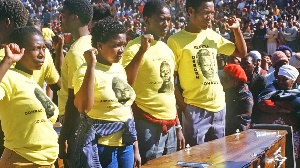- Home - News
- Elections 2024
- News Archive
- Crime & Punishment
- Politics
- Regional
- Editorial
- Health
- Ghanaians Abroad
- Tabloid
- Africa
- Religion
- Photo Archives
- Press Release
General News of Wednesday, 19 March 2025
Source: www.ghanawebbers.com
Ghosts of apartheid haunt South Africa as compensation anger brews
South Africa continues to grapple with the lingering effects of apartheid, as growing discontent over compensation for its historical injustices surfaces. Many citizens feel that the government has not adequately addressed the disparities created by decades of institutionalized racism. The ruling party faces increasing pressure from both victims of apartheid and those who believe reparations are long overdue.
Protests have erupted as communities demand accountability and financial restitution, reflecting a broader frustration with socio-economic inequalities that persist today. Critics argue that without meaningful reparations, the wounds of apartheid will remain unhealed, perpetuating cycles of poverty and disenfranchisement among marginalized populations.
Government officials acknowledge the challenges but assert that they are committed to addressing these issues through various initiatives. However, skepticism remains high regarding their effectiveness and timeliness. As South Africans confront this complex legacy, the call for justice grows louder, highlighting a nation still wrestling with its past while striving for a more equitable future. The road ahead appears fraught with tension as hopes for resolution collide with deep-seated grievances.











